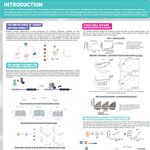Development of a T cell engineering platform for fully-individualized neoantigen-specific TCR therapy
Adoptive transfer of T cell receptor (TCR)-edited T cells to target cancer neoantigens is a promising new immunotherapy approach. We have developed a platform that can identify neoantigen-reactive TCRs in a high-throughput and patient-specific manner. To incorporate these TCRs into a clinical T cell product, we have simultaneously developed an engineering process that uses CRISPR gene editing to introduce neoantigen-reactive TCRs into the endogenous TCRα locus of a patient’s own T cells, with TCR knock-in efficiencies of >40% being achieved. However, editing efficiencies were highly variable across donors, which may limit therapeutic efficacy following clinical implementation.
To address this, we have developed a novel drug-based selection method by incorporating a mutant dihydrofolate reductase (mDHFR) gene into the TCR DNA repair template and subsequently selecting cells with methotrexate, a cytostatic drug that inhibits wildtype but not mDHFR. With only three days of methotrexate treatment, efficient enrichment of TCR-edited T cells to an average purity of 80% was achieved across donors. Notably, TCR expression in the methotrexate-selected mDHFR–expressing T cells was comparable with unselected control cells, and further analysis revealed equivalent proliferation, cytokine secretion and tumor cell killing capacities.
In parallel, to identify and track successfully edited T cells, we aimed to characterize the minimal epitope of the anti-murine TCR Cβ antibody H57 and engineer it into human TCRs. We identified 10 murine amino acids as potential antibody contact sites, which after incorporation into human TCR Cβ enabled H57 antibody binding. Subsequent swapping of the individual residues back to their human counterpart revealed the minimal epitope, which required only 6 murine residues (Mur6). Engineering of the Mur6 epitope into human TCR Cβ facilitated detection of TCR-edited T cells without impacting TCR expression or function.
We have applied TCR gene editing incorporating the Mur6 and DHFRMUT tools for clinical scale manufacturing of multi-specific T cell products that will be utilized in an upcoming clinical study of fully individualized neoantigen-specific TCR therapy.
Taken together, we have developed a novel T cell engineering process that enables efficient selection and tracking of TCR-edited T cells that will be utilized for T cell product manufacturing in an upcoming clinical study of fully individualized neoantigen specific TCR therapy.
- Incorporation of a Mur6 epitope in the β-chain constant domain of the introduced TCR enables quantification of TCR-edited T cells in T cell products and tracking of these cells following infusion.
- Incorporation of a DHFRMUT into the TCR-encoding DNA repair template enables efficient enrichment of TCR-edited T cells with MTX and generates T cell products with enhanced cytokine production and tumor control capacities.
- Application of TCR gene editing to incorporate the Mur6 and DHFRMUT tools for clinical scale manufacturing of multi-specific T cell products that will be utilized in an upcoming clinical study of fully individualized neoantigen-specific TCR therapy.




